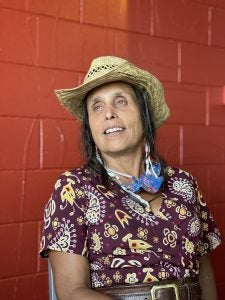Winona LaDuke
 Winona LaDuke is a Harvard-educated economist, environmental activist, author, hemp farmer, grandmother, and a two-time former Green Party Vice President candidate with Ralph Nader. LaDuke specializes in rural development, economic, food, and energy sovereignty and environmental justice. Living and working on the White Earth reservation in northern Minnesota, she leads several organizations including Honor the Earth (co-founded with The Indigo Girls 28 years ago), Anishinaabe Agriculture Institute, Akiing, and Winona’s Hemp.
Winona LaDuke is a Harvard-educated economist, environmental activist, author, hemp farmer, grandmother, and a two-time former Green Party Vice President candidate with Ralph Nader. LaDuke specializes in rural development, economic, food, and energy sovereignty and environmental justice. Living and working on the White Earth reservation in northern Minnesota, she leads several organizations including Honor the Earth (co-founded with The Indigo Girls 28 years ago), Anishinaabe Agriculture Institute, Akiing, and Winona’s Hemp.
These organizations develop and model cultural-based sustainable development strategies utilizing renewable energy and sustainable food systems. She is also an international thought leader and lecturer in climate justice, renewable energy, and environmental justice, plus an advocate for protecting Indigenous plants and heritage foods from patenting and genetic engineering.
In 2021, she was named to the first Forbes list of “50 Over 50 – Women of Impact,” in partnership with Mika Brzezinski’s “Know Your Value,” dedicated to shining a light on women over the age of 50 who have achieved significant success later in life, often overcoming formidable odds or barriers. In 1994, LaDuke was nominated by Time Magazine as one of America’s 50 most promising leaders under 40 years of age. She was awarded The Thomas Merton Award in 1996, The Biha Community Service Award in n 1997, The Ann Bancroft Award for Women’s Leadership Fellowship, and The Reebok Human Rights Award (which she used to begin the White Earth Land Recovery Project). In 1998, Ms. Magazine named her Woman of the Year for her work with Honor the Earth.
A graduate of Harvard and Antioch Universities, she also has written extensively on Native American and Environmental issues. LaDuke is a former board member of Greenpeace USA and serves as co-chair of the Indigenous Women’s Network, a North American and Pacific Indigenous women’s organization.
Her seven books include: The Militarization of Indian Country (2011); Recovering the Sacred: The Power of Naming and Claiming (2005); The non-fiction book All Our Relations: Native Struggles for Land and Life (1999, South End Press); and a novel, Last Standing Woman (1997, Voyager Press). Her new book, To Be a Water Protector: Rise of the Wiindigoo Slayers (Fernwood Press/Columbia University), is an expansive, provocative engagement with issues that have been central to her many years of activism, including seven years battling Line 3 — an Enbridge tar sands oil pipeline in northern Minnesota.
